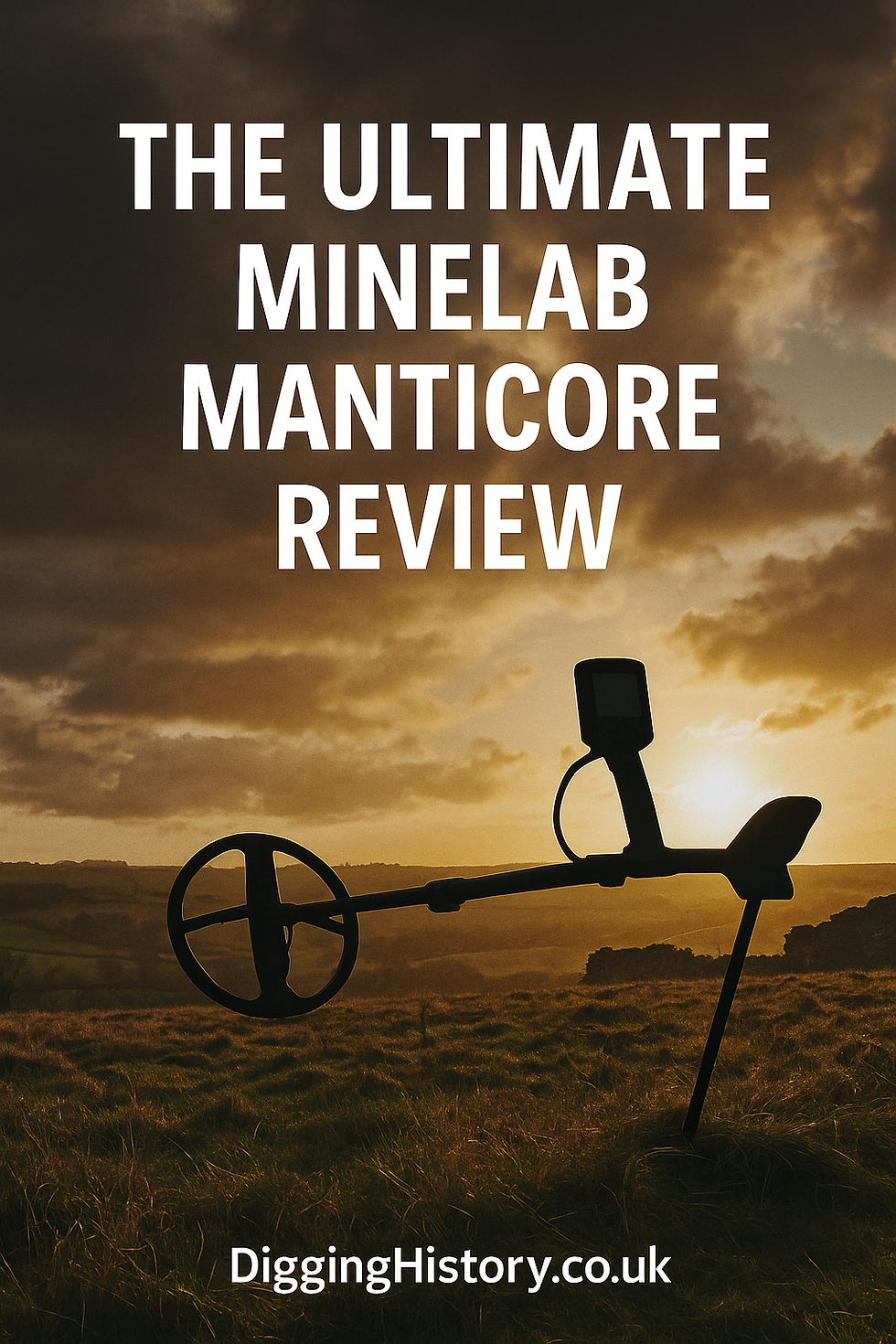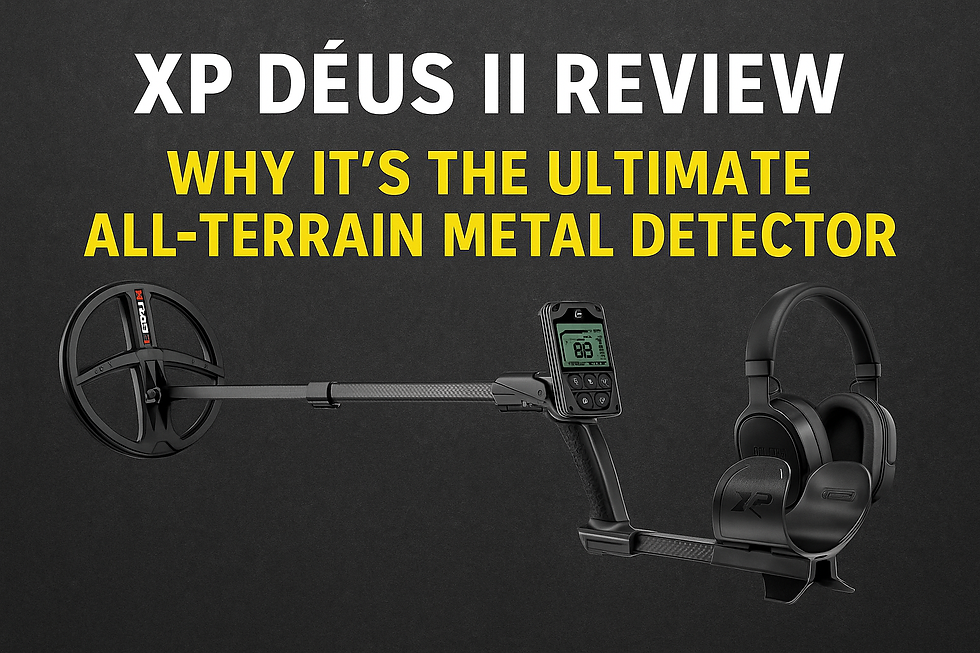Tech vs. Instinct: Does Modern Gear Beat the Old Detectorist’s Gut Feeling in Metal Detecting?
- DiggingHistory.co.uk
- Sep 28
- 7 min read
The Eternal Debate in Metal Detecting
Ask any group of detectorists down the pub and you’ll soon discover there’s one debate that never dies: Does the latest high-tech detector really give you the edge, or is good old-fashioned instinct still king?
On one side, you’ve got detectorists armed with sleek, Wi-Fi-enabled machines that cost as much as a second-hand car. On the other, you’ll find the veterans, some still swinging battered old detectors from the 1980s, who insist it’s not about the machine, it’s about the person behind it.
But who’s right? Does metal detecting in the UK really depend on cutting-edge technology, or does your gut feeling still matter more than all the digital bells and whistles in the world?
In this article, we’ll dig deep (pun very much intended) into the fascinating clash between tech and instinct in metal detecting. We’ll look at the history of detectors, the rise of modern technology, the mysterious power of intuition, and the moments when each side clearly wins out. We’ll also have a laugh along the way, because if there’s one thing every detectorist knows, it’s that you need a good sense of humour when you’ve just spent six hours digging up ring pulls.

A Short History of Metal Detecting: From Buzzers to Bluetooth
Before we can weigh tech against instinct, it’s worth looking back at where it all started.
Metal detecting as a hobby in the UK began to take off in the late 1960s and early ’70s. Early machines were basic: heavy, noisy contraptions that buzzed whenever they sensed anything metallic. There were no fancy displays, no discrimination features, and certainly no depth readouts. If it beeped, you dug and if you were lucky, it wasn’t just another rusty nail.
By the 1980s, things improved. Companies like Minelab, Fisher, Garrett, and XP began introducing more sophisticated detectors that could sort of tell the difference between iron and non-ferrous metals. They weren’t perfect, but they cut down on at least some of the junk digging.
Fast-forward to today, and we’re in the age of smart detectors. Machines can now:
Operate on multiple frequencies simultaneously.
Pair with your smartphone for GPS mapping and signal analysis.
Cancel out mineralisation in soil and saltwater with the touch of a button.
Tell you the target’s depth and approximate metal type before you even pick up your spade.
Some detectorists joke that the only thing modern machines can’t do yet is dig the hole for you.
But here’s the thing: even with all that tech, people with decades of detecting experience will tell you, sometimes your gut feeling is the most powerful detector of all.
The Case for Tech: Why Modern Machines Are Game-Changers
There’s no doubt that today’s technology has changed the landscape of metal detecting in the UK. If you’re new to the hobby, you’ll be at a serious advantage starting with a modern detector.
1. Depth and Precision
Modern machines can detect targets at depths that older machines simply couldn’t reach. Multi-frequency detectors, for example, are brilliant at picking up tiny hammered coins that would once have gone unnoticed.
2. Discrimination
Today’s detectors can give you a pretty good idea of what’s under the soil before you dig. They’re not fool proof (plenty of ring pulls still masquerade as coins), but they massively reduce wasted effort.
3. Adaptability
Tech excels in tricky environments. Detecting on mineralised farmland? Hunting for treasure along a salty beach? Modern detectors let you adjust settings in seconds to suit the conditions.
4. Data and Mapping
Some machines now track where you’ve been, so you can grid-search more effectively. Others store your finds data, helping you build a digital record of your hunts.
In short: tech levels the playing field. A beginner with a good modern detector has a fighting chance of making impressive finds on day one.
The Case for Instinct: Why Experience Still Matters
But here’s the rub: technology can only tell you so much. It can’t replace years of experience, sharp observation, and a detectorist’s intuition about where treasure is most likely to be hiding.
1. Reading the Land
Veterans can glance at a field and spot features invisible to newcomers: the tell-tale ridges of medieval ploughing, the faint lines of an ancient trackway, or the dip in the ground that might mark an old well. Tech can’t see that.
2. Interpreting Signals
A machine might give a weak or dodgy signal that most would ignore. But a seasoned detectorist sometimes gets a “feeling” about it and digs anyway, only to uncover a hammered silver coin or a Roman fibula brooch.
3. The Human Gut
Science can’t fully explain intuition, but we all know it exists. Call it luck, call it instinct, call it experience but time and again, stories surface of detectorists who “just knew” to check one more corner of a field, and walked away with a once-in-a-lifetime find.
4. Patience and Persistence
Tech can’t dig for you, and it can’t keep you motivated after five hours of pulling out nothing but tin foil. That’s where instinct and personality come in. The best finds often happen to the ones who persevere.
Famous Finds: Tech vs. Instinct in Action
To really see how tech and instinct work in the field, let’s look at some famous UK finds.
The Staffordshire Hoard (2009)
Discovered by Terry Herbert with a Minelab detector, this Anglo-Saxon treasure trove was a triumph of modern technology. Without the depth and sensitivity of his machine, much of it might have remained buried. But Terry’s persistence and decision to thoroughly sweep the field also showed instinct at play.
The Hoxne Hoard (1992)
Eric Lawes stumbled upon the largest hoard of late Roman silver and gold in Britain using a relatively modest detector. Many say his success came from his decision to carefully investigate a weak signal instead of ignoring it. Instinct beat tech that day.
Random Local Stories
Ask any detecting club, and you’ll hear stories of incredible finds that never should have been dug. One detectorist in Norfolk dug a “rubbish” signal just to clear it, only to find a Bronze Age axe head beneath the junk. That’s pure instinct.
Detector Comparisons: Entry-Level vs Top-End
To understand how much tech matters, let’s break down detectors by type.
Entry-Level (£200–£400): Great for beginners. They’ll find coins and modern relics easily, but struggle in mineralised soil and lack fine discrimination.
Mid-Range (£500–£900): A sweet spot for most hobbyists. Better discrimination, more depth, and usually lighter to carry.
Top-End (£1,000+): Machines with advanced ground balancing, multi-frequency operation, GPS, and wireless everything. These can sniff out coins others would miss.
But here’s the kicker: give a beginner a £1,500 detector and an experienced detectorist a £300 one, and the veteran will often walk away with the better haul. Why? Instinct.
Seasonal Detecting: Does Instinct Change with the Weather?
Metal detecting in the UK isn’t just about the machine, it’s also about timing.
Winter: Frost-hardened ground is tough, but fields often get ploughed after harvest, bringing fresh finds within reach. Instinct tells you which ridges to work.
Spring: Grass growth begins, limiting pasture sites. But freshly seeded fields can be productive.
Summer: Hard soil can make digging miserable. Many detectorists rely on instinct to choose shaded, damper areas that are easier to work.
Autumn: Perhaps the best season. Harvest reveals new ground. Instinct and tech combine to make this the busiest time for clubs.
Folklore and Superstition in Metal Detecting
Detectorists aren’t immune to a bit of folklore. Some swear by lucky charms, others believe certain fields are “cursed” because they never produce anything good. There are even stories of phantom figures guarding treasure sites, a nod to ancient myths of spirits protecting buried gold.
One common superstition: never brag about a “hot spot” too soon. The moment you tell the club you’ve found a great patch, it mysteriously dries up. Coincidence, or the curse of loose lips?
Detecting Clubs: Where Tech Meets Instinct
If you want to see the debate in action, just visit a metal detecting club. Half the members will be talking about the latest Minelab or XP model, while the other half roll their eyes and insist “it’s not the detector, it’s how you use it.”
Clubs are also where instincts are sharpened. Newcomers learn to read land by watching veterans, while tech enthusiasts often teach others how to tweak settings for maximum performance.
Humour from the Field
Let’s be honest: if metal detecting were only about the finds, most of us would have given up years ago. For every hammered coin, there are hundreds of ring pulls, shotgun shells, and bottle tops.
That’s where humour comes in. Detectorists love to swap tales like:
“I dug a perfect 12-inch plug for what I thought was a Roman coin… turned out to be a Coke can.”
“The machine screamed like I’d just found Excalibur. It was a rusty old horseshoe.”
“Best find of the day? My car keys, after I dropped them in the stubble.”
And yet, those moments of frustration are part of what makes the hobby so addictive. You never know when the next beep could change your life.
The Future of Detecting: Will Instinct Still Matter?
With AI and ever-smarter detectors on the horizon, some wonder if instinct will eventually become obsolete.
Future machines may be able to analyse soil conditions in real time, identify objects with near certainty, and even suggest where to dig next. But even then, instinct will still matter. Someone has to decide which fields to explore, which permissions to chase, and when to keep swinging despite the odds.
After all, the thrill of detecting isn’t just about efficiency, it’s about the adventure.
Conclusion – So, Who Wins?
So does technology beat instinct, or is it the other way around?
The truth is: neither wins outright.
Without modern tech, we’d never reach the depths, separate treasure from trash, or adapt to difficult conditions.
Without instinct, we’d walk past the signs, ignore the dodgy signals, and give up too soon.
Metal detecting in the UK thrives on the balance between the two. Tech sharpens our chances, but instinct brings the human element that turns a beep into a story.
And maybe that’s the real magic. The detector finds the metal but it’s your instinct that uncovers the history.





Comments